|
|
|
Sort Order |
|
|
|
Items / Page
|
|
|
|
|
|
|
| Srl | Item |
| 1 |
ID:
187213
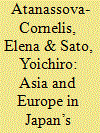

|
|
|
|
|
| Summary/Abstract |
This article examines Japan’s security alignments with key Asian and European partners, notably Australia, India, the UK, France and the EU itself. The articles explores Tokyo’s strategic expectations with regard to each of the five partnerships, as well as probing the likely future evolution of these alignments by providing a comparative perspective. Japan’s alignments with Australia and India conform with and supplement the US-Japan alliance, addressing Japan’s primary geostrategic concerns in the Asia-Pacific and the Indian Ocean region. Tokyo’s security partnerships with the European partners, and the EU, are more recent and not rooted in any US-led alliance in Asia. The degree of traditional kinetic military power these European players can bring to Asia is very limited. However, the pace with which Japan’s new European alignments are quickly moving beyond the non-traditional security areas to encompass more traditional defence and military-security fields attests to their potential of evolving in the future into mechanisms able to perform a broad range of security functions in response to complex security threats. The boundaries between these two categories of partnerships are likely to be further blurred, providing Japan with various mechanisms at different levels to shape and influence the regional and global security environment.
|
|
|
|
|
|
|
|
|
|
|
|
|
|
|
|
| 2 |
ID:
187215
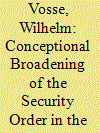

|
|
|
|
|
| Summary/Abstract |
This article argues that the focus of the still nascent Indo-Pacific “security order” should be extended from traditional, predominantly maritime, security concerns to include information and cybersecurity. This reflects the growing awareness that the global and regional security order is increasingly undermined by information technology and an AI duopoly. Therefore, it is necessary to broaden the concept “security order” to “cyber security order” with the aim of defending and strengthen a liberal order through cooperation in joint investment, technology exchange, and capacity building. Japan and Europe, which have long been strong defenders of international norms, have both broadened their security focus to include the Indo-Pacific, having recognized the gradual political shift towards this region. Their shared concern is that information and communication technology (ICT) can be used by governments and major technology companies to undermine democratic principles. Through several joint agreements the EU and Japan have not only deepened their mutual strategic cooperation, but they consider the protection of a free and open cyber security order in the Indo-Pacific as their joint endeavour.
|
|
|
|
|
|
|
|
|
|
|
|
|
|
|
|
| 3 |
ID:
187214


|
|
|
|
|
| Summary/Abstract |
Given extensive trade ties, Asia is critical not only for the prosperity of the European continent, but also for the secure flow of goods and services. Unsurprisingly, the EU has repeatedly stated that the EU’s essential interests are closely tied up with developments in Asia, and with the foreign and security policies of the region’s main players. But how much of this rhetoric has been translated into actual security alignments and cooperation between the EU and Asian partners? It is the aim of this article to examine existing security alignments between the EU and Asia in three ways. One is to examine the forms (inter-regional, sub-regional or bilateral) by which EU-Asia security alignments are advanced. The second is to explore the security areas (military versus non-military ones) in which alignment has either been advanced or not and to what extent. The third is to assess how existing EU-Asia security alignments are affected by geo-political changes, such as through the increasing technological, political and military strength of China, the growing political and military Sino-American rivalry, and the post-Covid environment.
|
|
|
|
|
|
|
|
|
|
|
|
|
|
|
|
| 4 |
ID:
187218


|
|
|
|
|
| Summary/Abstract |
This article, based on conversations with the former UN and EU representative Francesc Vendrell, describes the efforts made by Vendrell to mediate between the international community and the various players in the Afghanistan conflict between 2000 and 2008, including the Taliban and the Northern Alliance. It covers the breakdown of the previous Tashkent Declaration, a meeting with Mullah Omar, the destruction of the Bamiyan Buddhas, ‘9/11’, and the subsequent Bonn Accords and new Afghan constitution, in which Afghan warlords played a significant role. It also describes how the USA and Iran developed back-channel links during the period thanks to Vendrell’s mediation work, links which were later broken on account of President George W. Bush’s ‘Axis of Evil’ speech.
|
|
|
|
|
|
|
|
|
|
|
|
|
|
|
|
| 5 |
ID:
187219
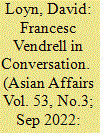

|
|
|
|
|
| Summary/Abstract |
This article is a transcript of a conversation between Francesc Vendrell, the former UN and EU meditator who dealt with many conflicts, particularly in Afghanistan and East Timor, and David Loyn, visiting Senior Fellow in the War Studies Department at King’s College London, and a former BBC Bureau Chief in South Asia and correspondent to Afghanistan. This conversation, which took place in 2019, focuses on Vendrell’s broader career in and beyond Asia, and offers various insights into the practice of mediation.
|
|
|
|
|
|
|
|
|
|
|
|
|
|
|
|
| 6 |
ID:
187220
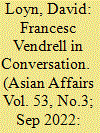

|
|
|
|
|
| Summary/Abstract |
This article is a transcript of a conversation between Francesc Vendrell, the former UN and EU meditator who dealt with many conflicts, particularly in Afghanistan and East Timor, and David Loyn, visiting Senior Fellow in the War Studies Department at King's College London, and a former BBC Bureau Chief in South Asia and correspondent to Afghanistan. This conversation, which took place in 2019, focuses on Vendrell's role in the East Timor situation from the time of its annexation by Indonesia, to his role in mediating its independence following the 1999 referendum.
|
|
|
|
|
|
|
|
|
|
|
|
|
|
|
|
| 7 |
ID:
187221
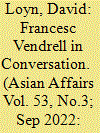

|
|
|
|
|
| Summary/Abstract |
This article is a transcript of a conversation between Francesc Vendrell, the former UN and EU meditator who dealt with many conflicts, particularly in Afghanistan and East Timor, and David Loyn, visiting Senior Fellow in the War Studies Department at King's College London, and a former BBC Bureau Chief in South Asia and correspondent to Afghanistan. This conversation, which took place in 2019, focuses on Vendrell's role in the Afghanistan situation from 2000 under Taliban rule, where he engaged in mediation efforts with the Taliban, to the period of the 9/11 attacks and the subsequent development of a new constitution and government. It covers some of the reasons for the weaknesses of the government that developed after 9/11. It also covers the development of direct talks between the US and Iran during the period.
|
|
|
|
|
|
|
|
|
|
|
|
|
|
|
|
| 8 |
ID:
187217


|
|
|
|
|
| Summary/Abstract |
This article, based on original research and conversations with the former UN mediator Francesc Vendrell, describes the diplomatic efforts behind the process of bringing independence to East Timor. It also offers some broader lessons about international mediation based on the experience of East Timor
|
|
|
|
|
|
|
|
|
|
|
|
|
|
|
|
| 9 |
ID:
187216
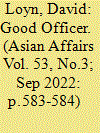

|
|
|
|
|
| Summary/Abstract |
This is an introduction to the Asian Affairs Special Section with articles based on long interviews of Francesc Vendrell, the former UN and EU envoy to Afghanistan and East Timor.
|
|
|
|
|
|
|
|
|
|
|
|
|
|
|
|
| 10 |
ID:
187210
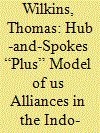

|
|
|
|
|
| Summary/Abstract |
A reassessment the nature of “alliances” and “alignments” since the end of the Cold War, both practically and conceptually, is long overdue. Treaty alliances have become partially obsolescent as new models of security cooperation, such as the ‘strategic partnership’, and other “minilateral” configurations, have emerged as preferred instruments of alignment. The evolving nature of alliance and alignment is nowhere better illustrated than in the metamorphosis of the venerable Hub-and-Spokes US alliance system in the Indo-Pacific. This article captures the changes occurring in the US alliance system from both a macro-level (structural) standpoint, before proceeding to the micro-level to evaluate individual alliance/partnership dyads to illustrate the complexion of the hub-and-spokes “plus” configuration of today. It argues that we are witnessing is a “reshuffling of the deck” in terms of traditional treaty allies – with Japan and Australia now forming the “core” of the system, with South Korea effectively confined as a “single-issue” alliance focused on the peninsula, and with Thailand and the Philippines (arguably) becoming increasingly “peripheral”. But even as the original treaty-system contracts, Washington is seeking to “network” the original model through the acquisition of non-treaty strategic partnerships with key states such as India, Singapore, (and, more circumspectly – Taiwan), whilst also welcoming European engagement. This networking strategy is also designed to achieve second and third order effects through incentivisation of direct “spoke-to-spoke” security cooperation and through the concentration of allies/partners into minilateral formations. The resultant reconfiguration might be dubbed a Hub-and-Spokes “plus” model.
|
|
|
|
|
|
|
|
|
|
|
|
|
|
|
|
| 11 |
ID:
187222


|
|
|
|
|
| Summary/Abstract |
In 1994, two years after the foundation of a de facto Semi-Autonomous Kurdistan Region, a civil war between the Kurdistan Democratic Party (KDP) and the Patriotic Union of Kurdistan (PUK) broke out, jeopardizing all the Kurdish national movement had achieved. While the US-brokered Washington Peace Agreement in 1998 brought an end to the civil war, its consequences remained entrenched in the region's socio-political and governance framework. This article examines how the Kurdish civil war shaped the governing system in the Kurdistan Region of Iraq (KRI) for a decade and caused the region to divide into two different administrations, impeding the establishment of effective governmental institutions. This analysis demonstrates that the governing system reflected partisan demands during and after the civil war, making it difficult to separate the political parties and the government or state apparatus.
|
|
|
|
|
|
|
|
|
|
|
|
|
|
|
|
| 12 |
ID:
187224
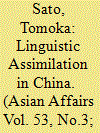

|
|
|
|
|
| Summary/Abstract |
Recent news about China's attitude the human rights of Uighurs in Xinjiang and its crackdown on civil liberties in Hong Kong has drawn a great deal of attention in the western media, with China facing a barrage of criticism from that source. Shortly before these developments came to light, China was taken to task over violence against Tibetans, which some viewed as cultural genocide. In contrast, the plight of Inner Mongolians is not widely known. In 2020, the Chinese government announced a new language policy promoting immediate Mandarin-language education in schools in the region. This shows how actively China has been eradicating the identity of peripheral minority groups. This article begins with a brief historical overview of China's linguistic assimilation policy toward ethnic minorities, followed by an investigation based on existing research and media information on the current position in Inner Mongolia and in particular of Mongolians living in Japan.
|
|
|
|
|
|
|
|
|
|
|
|
|
|
|
|
| 13 |
ID:
187211
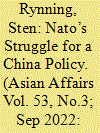

|
|
|
|
|
| Summary/Abstract |
NATO has promised to address China as “an alliance” but struggles to define underpinning principles. This article explores NATO's policy options and prospects. It traces the evolution of NATO China policy from 2017 on; assesses NATO's ability to pull China under its resiliency policy regime; and evaluates NATO's capacity to address wider issues of global order. The article concludes that NATO is not able to develop a politico-military strategy in line with classical alliance policy. Instead, NATO has pursued an incremental alignment policy to nourish its internal consensus and stave off the dire prospect of leadership abdication. Pushed by China's implicit support for the war in Ukraine, NATO must now become more politically explicit about China, global order, and NATO's approach to it.
|
|
|
|
|
|
|
|
|
|
|
|
|
|
|
|
| 14 |
ID:
187226
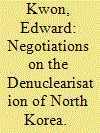

|
|
|
|
|
| Summary/Abstract |
This article analyzes a series of summit diplomacy efforts by the former United States President Donald Trump, and South Korea's President Moon Jae-in, to persuade North Korean leader Kim Jong Un to give up the country's nuclear weapons program. Through critical evaluation of the summits between Trump and Kim as well as Moon and Kim, the paper provides several important lessons on how to deal with North Korea. Kim Jong Un's mindset and strategic calculation of a denuclearization deal with Trump, amid the recent progress of North Korea's nuclear weapons and ICBMs programs, are investigated. Given the failure to reach a denuclearization agreement at the Hanoi Summit, Pyongyang is not expected readily to give up its nuclear weapons. North Korea had temporarily refrained from severe military provocations, such as test-firing ICBMs or conducting another round of nuclear weapon experiments by self-moratorium since April 2018. However, Pyongyang reversed direction with this policy in 2022 and resumed coercive diplomacy in order to achieve its desired goals. As North Korea's incessant efforts to advance its nuclear weapons and ICBMs programs brings with a dismal outlook for peace building both on the Korean Peninsula and the world, this paper investigates a series of policy lessons to manage the North Korean nuclear crisis.
|
|
|
|
|
|
|
|
|
|
|
|
|
|
|
|
| 15 |
ID:
187223
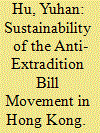

|
|
|
|
|
| Summary/Abstract |
After the 2014 Umbrella Movement, the motivation for pro-democracy forces to successfully mobilise an active and large-scale social movement in Hong Kong fell into abeyance. However, the Extradition Law Amendment Bill provided a new impetus, and the 2019 Anti-Extradition Bill (Anti-ELAB) movement suddenly broke the silence, launching a series of protests and protester-police confrontations. This article aims to explore the sustainability of this movement up to the date that the extradition bill was withdrawn on 4 September 2019. The article identifies two transformative events that facilitated the intense escalation of the movement. The events suggest the issue of “police brutality” perceived by many Hong Kong people played a notable role in sustaining the movement. It also discusses how the ineffective tactics adopted by the Hong Kong government and police contributed to sustaining the movement. It argues that the proactive tactics implemented by the Hong Kong government in the Umbrella Movement were no longer capable of undermining the 2019 uprising.
|
|
|
|
|
|
|
|
|
|
|
|
|
|
|
|
| 16 |
ID:
187212
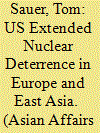

|
|
|
|
|
| Summary/Abstract |
Analysing the alliance system in Europe and Asia in a comparative perspective also demands having a look at the specific role of nuclear weapons in the defence doctrines, and more in particular the role of US extended nuclear deterrence. The main question that this article wants to resolve is: what are the similarities and differences in both regions with respect to extended nuclear deterrence? This (comparative) descriptive analysis is complimented with the following predictive question: which trends in both regions make it likely that extended nuclear deterrence will be strengthened, weakened, or maybe completely disappear? To answer these questions, the following structure is followed: first, the concept of extended nuclear deterrence will be described; next, this concept of extended nuclear deterrence will be applied to Europe and Asia; lastly, three trends that have an impact on the current debate on extended nuclear deterrence are analysed: 1) the deteriorating security situation; 2) the changing balance of power, and more in particular the relative decline of the US and the rise of China; and 3) the evolving nuclear arms control and disarmament regime, including the arrival of the Treaty on the Prohibition of Nuclear Weapons (TPNW).
|
|
|
|
|
|
|
|
|
|
|
|
|
|
|
|
| 17 |
ID:
187225
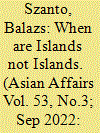

|
|
|
|
|
| Summary/Abstract |
The article takes a critical look at the sovereignty claims surrounding the Senkaku / Diaoyu Islands. The dispute has long plagued Sino-Japanese relations and is considered one of the key regional security hotspots, with the People's Republic of China mounting an active challenge to Japanese administrative control. This article reviews the case for sovereignty under both the discovery and the prescription principles. However, the article concludes that one cannot find a compelling case for sovereignty under either principle in favour of either claimants. The paper argues that this is due to the traditional insignificance of the islands prior to UNCLOS establishing exclusive economic zones. Rather, the article suggests that to facilitate a resolution to the disputes, the islands should not be classified as islands under UNCLOS as they do not meet the legal threshold for such a classification, either today or historically. If anything, the weakness of claims that contributes to the intractability of the dispute today shows that traditionally neither China nor Japan has considered these territories as islands in a manner that would be in the spirit of UNCLOS. While such a reclassification would not immediately resolve the dispute, it would be a significant step to remove incentives for the further pursuit of conflicting sovereignty over the islands.
|
|
|
|
|
|
|
|
|
|
|
|
|
|
|
|
|
|
|
|
|